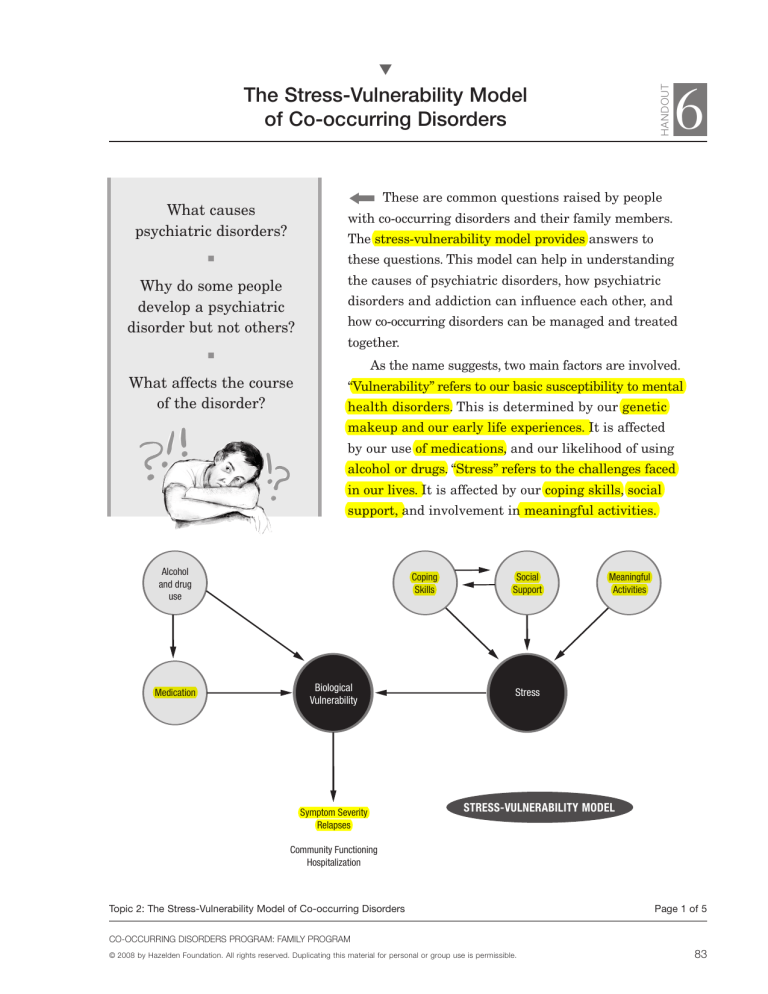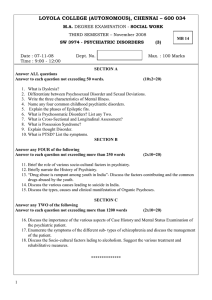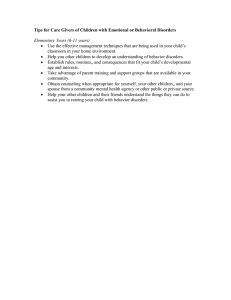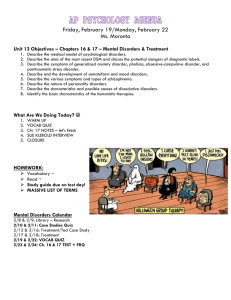
HANDOUT ▲ The Stress-Vulnerability Model of Co-occurring Disorders s 6 These are common questions raised by people What causes psychiatric disorders? with co-occurring disorders and their family members. ■ these questions. This model can help in understanding The stress-vulnerability model provides answers to Why do some people develop a psychiatric disorder but not others? the causes of psychiatric disorders, how psychiatric disorders and addiction can influence each other, and how co-occurring disorders can be managed and treated together. ■ As the name suggests, two main factors are involved. What affects the course of the disorder? “Vulnerability” refers to our basic susceptibility to mental health disorders. This is determined by our genetic makeup and our early life experiences. It is affected by our use of medications, and our likelihood of using alcohol or drugs. “Stress” refers to the challenges faced in our lives. It is affected by our coping skills, social support, and involvement in meaningful activities. Alcohol and drug use Medication Coping Skills Biological Vulnerability Symptom Severity Relapses Social Support Meaningful Activities Stress STRESS-VULNERABILITY MODEL Community Functioning Hospitalization Topic 2: The Stress-Vulnerability Model of Co-occurring Disorders Page 1 of 5 CO-OCCURRING DISORDERS PROGRAM: FAMILY PROGRAM © 2008 by Hazelden Foundation. All rights reserved. Duplicating this material for personal or group use is permissible. 83 X PAGE 2 OF 5 HANDOUT The Stress-Vulnerability Model of Co-occurring Disorders 6 Biological Vulnerability What Are the Elements of the Stress-Vulnerability Model? These two main areas—biological vulnerability and stress—are influenced by several other factors that people have some control over. These factors include • alcohol and drug use If we are vulnerable to something, it means we’re more likely to be affected by it. For example, some people might be biologically vulnerable to certain physical illnesses—such as heart disease or asthma. Maybe the disease runs in the family, or maybe something in our early life “set us up” for it. Some people are biologically vulnerable to certain psychiatric disorders: bipolar disorder, • medication use major depression, schizophrenia, or anxiety • coping skills disorders (panic, post-traumatic stress), for • social support example. This vulnerability is • meaningful activities determined early in life by a combination of factors, This means that by addressing including genetics, prenatal these factors (as described in the nutrition and stress, birth next column), people can reduce complications, and early symptoms and relapses and experiences in childhood improve the course of their co- (such as abuse or the loss of occurring disorders. Each of the a parent). This is why some families are more parts of the stress-vulnerability likely to have members with a particular psy- model is discussed on the pages chiatric disorder. Although vulnerability to that follow. psychiatric disorders is primarily biological in nature, people can take steps to reduce their vulnerability, including taking medication and not using alcohol or drugs, as discussed on the next page. It’s also worth noting that the greater a person’s vulnerability to a particular disorder, the earlier it is likely to develop, and the more severe it may become. Similarly, some people also have a biological vulnerability to developing an addiction: they are more likely to develop alcohol or drug abuse or dependence. This is why addiction, similar to psychiatric disorders, sometimes “runs in families.” CO-OCCURRING DISORDERS PROGRAM: FAMILY PROGRAM 84 © 2008 by Hazelden Foundation. All rights reserved. Duplicating this material for personal or group use is permissible. X PAGE 3 OF 5 HANDOUT The Stress-Vulnerability Model of Co-occurring Disorders 6 Alcohol and Drug Use Coping Skills Using alcohol or drugs can increase a per- Developing coping strategies can help with son’s pre-existing biological vulnerability handling stress and reducing its negative to a psychiatric disorder. Thus, substance effects on vulnerability. Examples of coping use can trigger a psychiatric disorder and skills include lead to more severe symptoms and other impairments. Because most people with co-occurring mental and substance use disorders have a biological vulnerability to psychiatric disorders, they tend to be highly sensitive to even small amounts of alcohol and drugs. Stress Stress in the environment can worsen biological vulnerability, worsen symptoms, and cause relapses. Stress is anything that challenges a person, requiring some kind of adaptation. Serious stressful events include losing a loved one, getting fired from a job, being a victim of crime, or having conflicts with close people. • relaxation skills for dealing with stress and tension • social skills for connecting with people, dealing with conflict, and getting support • coping skills for managing persistent symptoms such as depression, anxiety, and sleeping problems Stress is a normal part of life. Effective coping enables people to be engaged in interesting, rewarding activities that may involve stress, such as working or being a parent. Coping efforts can make it possible for someone with co-occurring disorders to live a normal life without suffering the negative effects of stress. Stress is often associated with negative events, but positive events and experiences Involvement in Meaningful Activities may be stressful as well. For example, Having something meaningful to do with performing well in school, getting a new one’s time gives one a sense of purpose, job, starting a new relationship, having a and reduces the stress of having nothing baby, or being a parent all involve some to do. Meaningful activities can include: degree of stress. It is also possible for stress to be caused by not having enough to do. When people with co-occurring disorders have nothing purposeful or interesting to do, they tend to • work • school • parenting or other caregiving responsibilities • homemaking have worse symptoms and are more prone to using substances. So a lack of meaningful involvement in life—in areas such as work or parenting, for example—can be another source of stress. CO-OCCURRING DISORDERS PROGRAM: FAMILY PROGRAM © 2008 by Hazelden Foundation. All rights reserved. Duplicating this material for personal or group use is permissible. 85 X PAGE 4 OF 5 HANDOUT The Stress-Vulnerability Model of Co-occurring Disorders 6 Treatment Implications of the Stress-Vulnerability Model Based on an understanding of the stress-vulnerability model, there are many ways to help people manage their psychiatric illness and co-occurring substance use Social Support disorder. In the broadest terms, Another way to reduce the negative effects the severity and course of a co- of stress on vulnerability is through social occurring mental health disorder support, which comes from having close and can be improved by reducing biolog- meaningful relationships with other people. ical vulnerability and increasing Supportive people can help in a variety of resiliency against stress. ways, such as • helping people solve challenging problems • supporting people in using coping strategies to deal with symptoms and substance-use urges • being open and willing to discussing and resolving personal disagreements, misunderstandings, and areas of conflict that could otherwise lead to stress • letting people know that they are important and cared about • supporting the person in pursuing personally meaningful goals People who have good social support are less vulnerable to the effects of stress on their psychiatric disorder. Therefore, having strong social support enables people with co-occurring disorders to handle stress more effectively, and live a normal life. CO-OCCURRING DISORDERS PROGRAM: FAMILY PROGRAM 86 © 2008 by Hazelden Foundation. All rights reserved. Duplicating this material for personal or group use is permissible. HANDOUT The Stress-Vulnerability Model of Co-occurring Disorders X PAGE 5 OF 5 6 Reducing Biological Vulnerability Increasing Resiliency against Stress Biological vulnerability can be reduced It is impossible for anyone to live a life in two primary ways: taking medication that is free of stress. However, there are and avoiding alcohol or drug use. Medica- many ways people can learn how to deal tion can be a powerful way of reducing with stress more effectively, and to protect biological vulnerability by helping to correct themselves from the effects of stress on the imbalances in neurotransmitters worsening symptoms and causing relapses, (chemicals in the brain responsible for including feelings, thinking, and behavior) believed • developing effective coping skills to cause psychiatric disorders. By taking for managing stress and persistent medication, the symptoms of a psychiatric symptoms disorder can be lowered and the chances of having a relapse can also be reduced. Avoiding alcohol and drug use can reduce biological vulnerability in two ways. First, because substances affect the brain, using alcohol or drugs can directly worsen those vulnerable parts of the brain associated with psychiatric disorders. Second, • getting involved in meaningful activities that structure one’s time and reduce the stress of having nothing to do • building socially supportive relation- ships that help one manage the mental health disorder and maintain sobriety using substances can interfere with the • • • corrective effects of medication on vulnerability. This means that somebody who is using alcohol or drugs will not get the full benefit of any prescribed medications for his or her disorder, leading to worse symptoms and a greater chance of relapses. By taking medication, the symptoms of a psychiatric disorder can be lowered and the chances of having a relapse can also be reduced. CO-OCCURRING DISORDERS PROGRAM: FAMILY PROGRAM © 2008 by Hazelden Foundation. All rights reserved. Duplicating this material for personal or group use is permissible. 87


